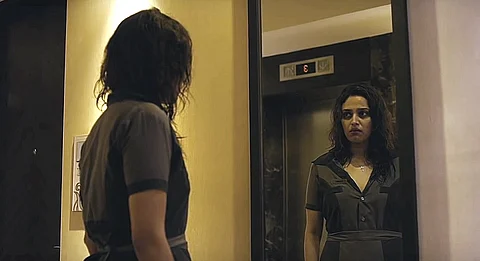
- Reviews
- Power List 2024
- Cannes 2024
- In-Depth Stories
- Web Stories
- News
- FC Lists
- Interviews
- Features
- FC SpecialsFC Specials

Director: Anusha Bose
Cast: Swara Bhaskar, Ranvir Shorey, Sayani Gupta, Cyrus Sahukar
Revenge and patriotism are the all-season flavours of Hindi cinema. Neither of these themes tends to earn its moral integration into the narrative these days. They infect the characters, rather than define them. The 25-minute short, Shame, directed by Anusha Bose, is another victim of this epidemic. It starts off as a ponderous and genuinely curious slice-of-life story about a hotel housekeeper named Fanny (Swara Bhaskar). But then, against the "run of play," it's the romanticization of revenge – the urge to exploit India's unsubtle class-divide and satiate the viewers' blood-lust – that hijacks the film.
The first few minutes are reminiscent of Shoojit Sircar's October; we see a hospitality employee go about the intricacies of her job with an air of veteran efficiency. Every room she cleans effectively acts as a peek into the murky windows of upper-class society – their little indulgences, private moments, secret relationships and gender dynamics. Bose expresses this portion through a nuanced visual language that promises to depict Shame as an intimate portrait of middle-class desire and longing. Fanny finds a discarded condom wrapper, a lacy piece of lingerie, dirty sheets, fallen wine glasses, and daydreams about the playful moments between the couple – a one-note Ranvir Shorey and short-film specialist Sayani Gupta – that led to the room's present condition. She feels like a front-row observer in a hallway that accommodates passengers in a state of constant flux. Bhaskar is subdued and suitably wide-eyed in these scenes. The film, too, internalizes her tiny flights of fantasy.
Once the guest walks in on her during her 'moment,' the short assumes the tone of an allegedly mischievous revenge dramedy. People start reacting like black-and-white caricatures – villain says "slut" and hero plans a heist, while slow-mo strides round it off – only and only so they can justify the film's problematic sense of resolution. The story seems to suggest that there is nothing like a mistake – a professional breach of trust – by a woman to expose the ugly entitlement of wealthy guests. And that these guests are invariably cheating husbands straight out of a '90s children's film.
It might have even worked as a full-throated Home-Alone-style comedy, but one suspects that Shame, like countless other films of our time, allows its noble intent to be sabotaged by the political incorrectness of social-message gimmickry. This is a pity, because Shame has the look, the resources, the artists and the voice to be different – a gift which, modern-day filmmakers should do well to note, is markedly unconnected to "making a difference".